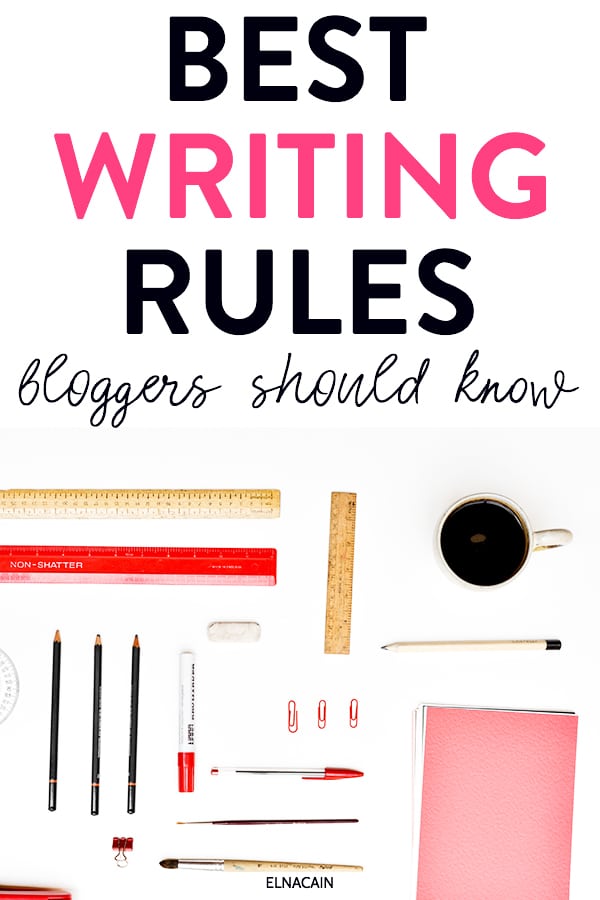Growing up, were you the kid at school who always turned in homework on time, finished class assignments before everyone else finished, and always had their hands up to answer a question a teacher asked?
Or, were you the kid who finished their homework during breakfast, sat in the back of the class and didn’t want to be called on?
No matter what type of kid you were during grade school, everyone I’m sure was grilled on writing skills and grammar rules.

And if you are a blogger or freelance writer, you may think those skills are essential to your ability to create awesome content.
I’m here to tell you that if you want to ace your next blog post, don’t listen to what your teacher told you about grammar rules. In fact, don’t even listen to yourself.
Having a blogging career means taking what you learned about grammar in school and throwing it out the patio door. You are no longer sitting in a school desk, listening to your teacher lecture about natural resources and then going home to write a report on three ways natural resources can be used for economical gain.
As a blogger, you have the luxury to blog wherever you want, write on whatever topic you want and share it with your readers.
Of course, if you have clients that require you to write or blog in a more formal manner about e-learning content or about medical training strategies, then please ignore this post!
I know it can be hard not to slip into the formal style of writing you were taught all throughout your school years. It’s ingrained in you and you may even feel a little anxious thinking anything but formal writing is wrong.
I mean, if you make a living doing this, why wouldn’t you follow all the grammar rules and write in a very formal matter? It only shows your professionalism to potential clients, right?
Brian Lash, Creative Director of First Blog Media, wrote on CopyBlogger that anything but a conversational and informal writing style will kill your online career. People don’t want to read a blog post like it’s an academic paper.
Online users are scanning your blogs, barely reading any of it with their pointer finger on the mouse ready to click to a new page. They definitely don’t want to be boggled down with reading a formal style using technical words.
So, if you want to ace your next post and still have a career, I suggest you follow these 5 rules about grammar (for bloggers), because it’s fluid and constantly changing.
Oh, and by the way, I was the kid who always turned in their homework on time and was eager to answer any question my teacher asked. But that all changed once I entered high school!
1. The Changing of Words and Meanings
Most bloggers tend to write as if they are talking directly to their audience. This is not a wrong thing to do. I often write like I’m talking, as it’s comfortable for me and helps me engage with my readers on a more personal level.
With writing like you talk though, you may encounter some words that you wouldn’t normally use in your high school book report because they may be too juvenile or not even a word!
Let’s take a look at some and feel free to use them for your next post.
- Very – Very is a word that, if used in your writing at school, would get crossed out with a note telling you to avoid using this adverb. But in online writing, using very can help with
- signaling emotion in a particular item, story, or product
- creating a positive impact on what you are trying to describe to your audience
- amplifying your verbs and nouns
- Hopefully – Traditionally, hopefully, indicates “in a hopeful manner” as in I hopefully waited for the show to begin. Recently, though, people have been using hopefully to mean “it is hoped that.” This way, it becomes a sentence adverb, modifying the entire sentence. For example, Hopefully, we’ll get a chance to visit the Grand Canyon next summer. So go ahead and use hopefully in the beginning of a sentence.
- Alright – If you don’t already know, alright is technically not even a word. You should be using all right. But, recently, alright as a word to mean “it’s just satisfactory” is becoming popular to use in writing.
2. Your Sentences Can End in a Preposition
Are you biting your nails at this thought?
All throughout school, I remember it was drilled into my head that ending my sentences with a preposition can drop your paper a whole letter grade. I made sure that I never ever finished my sentences with an at, of, up or over for fear of getting a C or worse on my papers.
But after starting my venture as a work-at-home mom and freelance writer, I learned quickly that not ending your sentence with a preposition is an actual grammar myth.
So don’t fear the thought of an imaginary lecture from your teacher and feel free to end your sentences with a preposition!
Just don’t add them if they are unnecessary. For example, you don’t need to say
Jane got off of the bed to get her morning coffee.
Instead, drop of and say
Jane got off the bed to get her morning coffee.
3. You Can Start a Sentence With And, Or and But
Ooo, another rule that’s probably making you cringe, right?
I know for myself, I cringed when I saw other bloggers and freelance writers start their sentences with and or but. I thought, did they not get the Coordinating Conjunctions lesson in school?
If you missed that lesson, think FANBOYS. And, I’m not talking about the next One Direction. FANBOYS is the acronym for the seven coordinating conjunctions for, and, nor, but, or, yet, so. These words help conjoin words and phrases in a sentence.
As writers, you do have the option of starting your sentences with and, or and but if, stylistically, fits what you are trying to say.
4. Go Ahead and Exclamation Point that Blog Post Up!
There has been a recent shift in the reader’s experience in online content and they are starting to prefer an abundance of exclamation points. But it doesn’t stop there! It’s now commonplace to use them in texts, emails and after any standard written greeting.
Why are we bombarding our readers with exclamation points? Using emphatic punctuation helps deliver the tone in your writing. It’s not always easy to convey sarcasm or excitement when writing.
Since most readers are rushing through your post, using exclamation points also
- Helps readers locate subtle information that might be beneficial to them
- Attracts readers’ eyes when you use multiple exclamation points in your post
- Makes sure you provided the most helpful information for your readers!
So don’t give it a second thought when you sit down to write your next blog post. Your readers will appreciate the sincerity in your tone and return the favor by commenting!
5. You Don’t Have to Spell Out Your Numbers
There’s something about numbers that intrigues our minds. When our brain processes what we read, we

tend to stop and focus on numbers and lists.
Effective bloggers use numbers in their headlines as they
- Entices the reader to click and read further
- Promises the reader to deliver a specific number of reasons, tips or tricks that they want to learn about
- Captures the reader amongst a sea of insignificant headlines
- Reassures the reader of a predetermined ending, satisfying their need of completion
Because of its eye catching quality, using numbers instead of writing them out, helps with grabbing readers’ attention and stopping their scanning.
Keep this in mind when writing your numbers in digits
- Use numerals in your sentences and at the beginning of sentences or bullet points
- Use numerals up to one billion. After that, write out your numbers as it’s confusing seeing too many zero’s
- Avoid using numerals for general facts, like I did in my previous bullet point
For more information about when to use numerals and when to write out your numbers, visit the Nielson Norman Group.
With these 5 grammar rules for bloggers, you are now equipped to lure your readers with a numbered list headline, grab their emotion with proclaiming your love of exclamation points, risk criticism for using alright in a sentence, and show your boldness in starting a sentence with and.
Do you find any of these 5 rules hard to make use of in your everyday writing? I find that I tend not to use too many exclamation points in my writing. I’m naturally a bubbly gal, but it may not come across that way online. In this post already, I’ve used more exclamation points than in any other post, so that’s a start!
Let me know what you think,, what kind of child you were in grade school, and if you adopt any other rules. I’m looking forward to hearing from you!
Please remember to pin me!




13 Comments